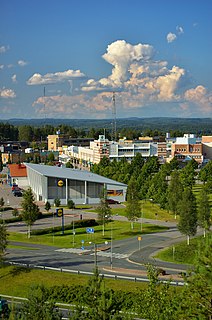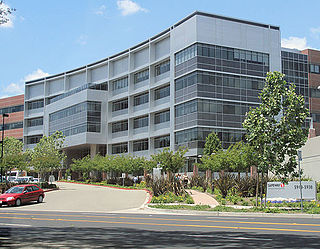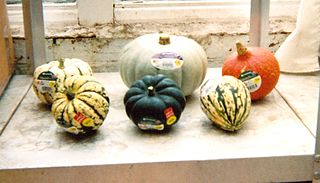
A convenience store, convenience shop, corner store or corner shop is a small retail business that stocks a range of everyday items such as coffee, groceries, snack foods, confectionery, soft drinks, ice creams, tobacco products, lottery tickets, over-the-counter drugs, toiletries, newspapers and magazines. In some jurisdictions, convenience stores are licensed to sell alcoholic drinks, although many such jurisdictions limit such beverages to those with relatively low alcohol content such as beer and wine. Such stores may also offer money order and wire transfer services, along with the use of a fax machine or photocopier for a small per-copy cost. Some also offer to sell tickets or recharge a smart card, like the OPUS card in Montreal. They differ from general stores and village shops in that they are not in a rural location and are used as a convenient supplement to larger stores.

A supermarket is a self-service shop offering a wide variety of food, beverages and household products, organized into sections. This kind of store is larger and has a wider selection than earlier grocery stores, but is smaller and more limited in the range of merchandise than a hypermarket or big-box market. In everyday U.S. usage, however, "grocery store" is synonymous with supermarket, and is not used to refer to other types of stores that sell groceries.

Tesco PLC is a British multinational groceries and general merchandise retailer headquartered in Welwyn Garden City, England. It is the third-largest retailer in the world measured by gross revenues and the ninth-largest in the world measured by revenues. It has shops in five countries across Europe, and is the market leader of groceries in the UK.

Asda Stores Ltd. is a British supermarket chain. It is headquartered in Leeds, England. The company was founded in 1949 when the Asquith family merged their retail business with the Associated Dairies company of Yorkshire. It expanded into Southern England during the 1970s and 1980s, and acquired Allied Carpets, 61 large Gateway Supermarkets and other businesses, such as MFI Group. It sold these acquisitions during the 1990s to concentrate on the supermarkets. It was listed on the London Stock Exchange until 1999 when it was acquired by Walmart for £6.7 billion. Asda was the second-largest supermarket chain in the United Kingdom between 2003 and 2014 by market share, at which point it fell into third place.
J Sainsbury plc, trading as Sainsbury's, is the second largest chain of supermarkets in the United Kingdom, with a 16.0% share of the supermarket sector.

Retail is the sale of goods and services to consumers, in contrast to wholesaling, which is sale to business or institutional customers. A retailer purchases goods in large quantities from manufacturers, directly or through a wholesaler, and then sells in smaller quantities to consumers for a profit. Retailers are the final link in the supply chain from producers to consumers. Shopping generally refers to the act of buying products. Sometimes this is done to obtain final goods, including necessities such as food and clothing; sometimes it takes place as a recreational activity. Recreational shopping often involves window shopping and browsing: it does not always result in a purchase.

A grocery store, grocery or grocery shop (UK), is a store that primarily retails a general range of food products, which may be fresh or packaged. In everyday U.S. usage, however, "grocery store" is a synonym for supermarket, and is not used to refer to other types of stores that sell groceries. In the UK, shops that sell food are distinguished as grocers or grocery shops, though in everyday use, people usually use either the term "supermarket" or a "corner shop" or "convenience shop".
Sales promotion is one of the elements of the promotional mix. The primary elements in the promotional mix are advertising, personal selling, direct marketing and publicity/public relations. Sales promotion uses both media and non-media marketing communications for a pre-determined, limited time to increase consumer demand, stimulate market demand or improve product availability. Examples include contests, coupons, freebies, loss leaders, point of purchase displays, premiums, prizes, product samples, and rebates.

Waitrose & Partners is a brand of British supermarkets, founded in 1904 as Waite, Rose & Taylor, later shortened to Waitrose. It was acquired in 1937 by employee-owned retailer John Lewis Partnership, which still sells groceries under the brand. Its head offices are located in Bracknell and Victoria, England. Waitrose & Partners has 332 shops across the United Kingdom, including 65 "little Waitrose" convenience shops, and a 5.1% share of the groceries market, making the company the eighth-largest retailer of groceries in the UK. They also export products to 52 countries and have locations in the Middle East.

In marketing, a coupon is a ticket or document that can be redeemed for a financial discount or rebate when purchasing a product.

Coles Supermarkets Australia Pty Ltd, trading as Coles, is an Australian supermarket, retail and consumer services chain, headquartered in Melbourne as part of the Coles Group.
Pathmark is a supermarket brand owned by Allegiance Retail Services, a retailers’ cooperative based in Iselin, New Jersey, USA. Pathmark currently has one location in East Flatbush, Brooklyn, New York, which it has operated since 2019.

Safeway is an American supermarket chain founded by Marion Barton Skaggs in April 1915 in American Falls, Idaho. The chain provides grocery items, food and general merchandise and features a variety of specialty departments, such as bakery, delicatessen, floral and pharmacy, as well as Starbucks coffee shops and fuel centers. It is a subsidiary of Albertsons after being acquired by private equity investors led by Cerberus Capital Management in January 2015. Safeway's primary base of operations is in the Western United States with some stores located in the Mid-Atlantic region of the Eastern Seaboard. The subsidiary is headquartered in Pleasanton, California, with its parent company, Albertsons, headquartered in Boise, Idaho.
Bogo or BOGO may refer to:

Food marketing brings together the food producer and the consumer through a chain of marketing activities.

Retailing in India is one of the pillars of its economy and accounts for about 10 percent of its GDP. The Indian retail market is estimated to be US$ 600 billion and one of the top five retail markets in the world by economic value. India is one of the fastest growing retail markets in the world, with 1.2 billion people.

A reusable shopping bag, sometimes called a bag-for-life in the UK, is a type of shopping bag which can be reused many times, in contrast to single-use paper or plastic shopping bags. It is often a tote bag made from fabric such as canvas, natural fibres such as jute, woven synthetic fibers, or a thick plastic that is more durable than disposable plastic bags, allowing multiple use. Other shoppers may use a string bag or a wheeled trolley bag. They are often sold in supermarkets and apparel shops.

Food waste in the United Kingdom is a subject of environmental, and socioeconomic concern that has received widespread media coverage and been met with varying responses from government. Since 1915, food waste has been identified as a considerable problem and has been the subject of ongoing media attention, intensifying with the launch of the "Love Food, Hate Waste" campaign in 2007. Food waste has been discussed in newspaper articles, news reports and television programmes, which have increased awareness of it as a public issue. To tackle waste issues, encompassing food waste, the government-funded "Waste & Resources Action Programme" (WRAP) was created in 2000.
Stamp collection is a common practice among retail outlets in Hong Kong. The concept is to allow customers to redeem free gifts or shopping discounts after purchase. The general mechanism is that stamps will be given to customers when their single purchase exceeds a certain amount of money.














